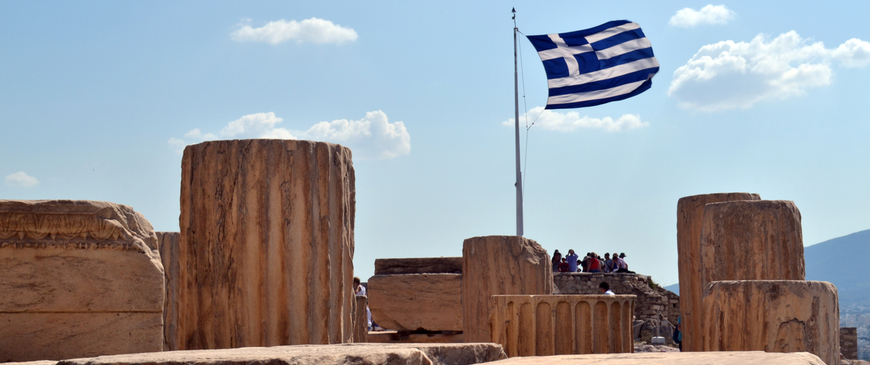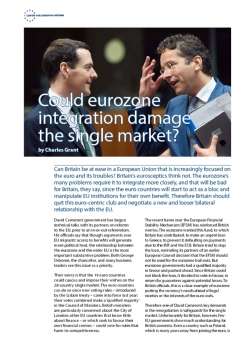
Greek foreign policy: The next ruin?
The economic consequences of Greece leaving the eurozone would be serious for the Greek people and the rest of the EU. The foreign policy implications could be equally bad. Russia policy aside, the Syriza-led coalition has been part of the European mainstream. If a post-Grexit Greece lurched from left-wing populist to right-wing nationalist government, its foreign policy could be an even bigger problem for Europe.
The EU and Greece have finally agreed on a bail-out deal. But, as Christian Odendahl and John Springford have written recently (‘The Greek bailout deal resolves nothing’, July 13th), its flaws are so serious that it is likely to fail eventually. Before EU leaders steel themselves to expel Greece from the eurozone, they should think about Greece’s geopolitical importance (and not just its flirtation with Russia).
According to Thanos Dokos, of the ELIAMEP think-tank, the last few Greek governments ignored foreign policy because they were overwhelmed by the economic crisis; the current government, by contrast, has re-engaged in a number of important areas. As long as Greece stays in the eurozone, Dokos sees Prime Minister Alexis Tsipras as the politician most likely to lead Greece, in a continued coalition with the right-wing populist Independent Greeks.
Opinion polls show that support for Independent Greeks and the extreme right ‘Golden Dawn’ combined is currently around 10 per cent. But if Greece leaves the eurozone, people might conclude that having tried mainstream parties and left-wing populists, their last hope lay with a coalition involving the extreme right ‘Golden Dawn’. Foreign as well as domestic policy would be affected. Here are seven issues to watch.
The first is migration. In the first six months of 2015, more than 70,000 refugees arrived in Greece. The country is struggling to cope. The Greek defence minister (and founder of the Independent Greeks), Panos Kammenos, threatened in March that Greece would "flood Europe with migrants" if its EU partners forced it out of the euro. If his position were strengthened post-Grexit, he would be better placed to carry out his threat.
The second issue is Turkey. Syriza has cautiously tried to improve relations with Ankara. While Kammenos’ rhetoric has been strongly anti-Turkish, he has not interfered with overall policy towards Turkey. But a successor government could involve both Independent Greeks and other extreme rightists. They might see confrontation with Turkey as a way to consolidate their popular support.
The third issue, and closely related to the second, is Cyprus. Syriza is ideologically remote from the current centre-right Cypriot government, but supports a Cyprus settlement including the withdrawal of Turkish forces. As a guarantor power, Greek support is essential for any agreement. Should relations with Turkey deteriorate, the prospects for a deal would recede.
The fourth is energy security. Greece could become an important transit country for gas reaching Europe via Turkey. The trans-Anatolian pipeline (TANAP) from Azerbaijan to the Greek-Turkish border and the trans-Adriatic pipeline (TAP) from there to Italy are already under construction. Syriza also supports the planned ‘Turk Stream’ pipeline from Russia via Turkey to Greece and the Balkans. ‘Turk Stream’ could challenge the viability of TAP, and would increase Gazprom’s already large share of South-Eastern European markets. After Grexit, a cash-strapped Greek government could be torn between the economic attraction of transit fees from Gazprom and the political fear of increasing its dependence on gas imports via Turkey.
The fifth concerns the Western Balkans. Greek banks are active in places like Albania and Serbia, and although their status as separate legal entities there should shield them from the worst impact of Greece’s financial woes, their fragility could still cause economic problems. Politically, if Syriza fell from power, the slow normalisation of relations between Greece and Kosovo could be derailed by a more nationalist, pro-Orthodox government. Such a government would be even less likely than the present one to make progress on the issue of Macedonia’s name, which is the main obstacle to that country joining the EU and NATO.
The sixth issue involves security and defence. Greece has traditionally spent a higher percentage of its GDP on defence than any other European ally, primarily to protect itself from Turkey rather than to join EU or NATO missions. Whether it stays in the eurozone or not, it will have to cut defence spending. But a more nationalist government may care less about NATO’s defence priorities, and more about standing up to Turkey – and prioritise accordingly.
The seventh issue is Greece’s relationship with Russia. Both Syriza and Independent Greeks have unhealthily close relations with Putin’s Russia – contributing to Athens’ poor relations with Central Europeans who feel threatened by Moscow. So far, despite public objections to EU sanctions, Greece has approved their renewal; but that might change if Greece were pushed out of the eurozone and offered a financial lifeline by Russia. The problem for the Central Europeans is that the most likely alternative to Syriza is no better: both Independent Greeks and Golden Dawn are Russophile.
The EU may not be able to prevent Greece from falling out of the euro. But its leaders should think hard about the foreign policy consequences of a weak and alienated Greece. The Syriza government may be an annoying negotiating partner, but its foreign policy may be the best on offer.
Ian Bond is director of foreign policy and Rem Korteweg is a senior research fellow at the Centre for European Reform.

